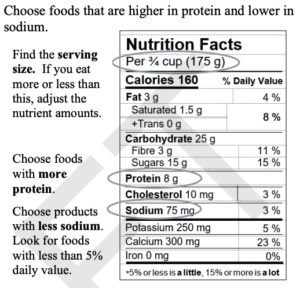
Dr. Puneeta Tandon, MD
Project Lead
(University of Alberta)

Michelle Carbonneau
Project Co-Lead
(University of Alberta)

Dr. Ashley Hyde, PhD
Postdoctoral Fellow
(University of Alberta)

Dr. Mahmod Mohamed, MBBCh
GI Partner with expertise in Quality Improvement
(University of Alberta)

Emily Johnson
Masters Student
(University of Alberta)

Dr. Amanda (Mandy) Brisebois, MD
Palliative Care Lead
(University of Alberta)

Dr. Kinjal Patel, MD
Internal Medicine Resident Advisor
(University of Alberta)

Derek Drager
Patient Lead

Development of the content hosted on this site is part of a large quality improvement project supported by Alberta Innovates called Cirrhosis Care Alberta (CCAB). Thank you to those listed below who contributed to the development and review of materials on this site or supported the Cirrhosis Care Alberta project.Thank you also to the many team members not listed below who have contributed to the CCAB project outside of the content contained in this website. We are grateful for everyone’s ongoing contributions and support!
Gastroenterologists/Hepatologists
Dr. Juan Gonzalez-Abraldes, MD (University of Alberta)
Dr. Wayne Bai, MBChB (University of Alberta)
Dr. RJ Bailey, MD (University of Alberta)
Dr. Vincent Bain, MD (University of Alberta)
Dr. Jasmohan Bajaj, MD (Virginia Commonwealth University)
Dr. Annalisa Berzigotti, MD (University of Bern)
Dr. Rahima Bhanji, MD (University of Alberta)
Dr. Patricia Bloom, MD (University of Michigan)
Dr. Meredith Borman, MD (University of Calgary)
Dr. Kelly Burak, MD (University of Calgary)
Dr. Carla Coffin, MD (University of Calgary)
Dr. Stephen Congly, MD (University of Calgary)
Dr. Bertus Eksteen, MBChB (University of Calgary)
Dr. Guadalupe Garcia-Tsao, MD (Yale University)
Dr. Leah Gramlich, MD (University of Alberta)
Dr. Klaus Gutfreund, MD (University of Alberta)
Dr. Rajveer Hundal, MD (University of Calgary)
Dr. Patrick Kamath, MD (Mayo Clinic College of Medicine)
Dr. Constantine Karvellas, MD (University of Alberta)
Dr. Adriana Lazarescu, MD (University of Alberta)
Dr. Mang Ma, MD (University of Alberta)
Dr. Vladimir Marquez, MD (University of British Columbia)
Dr. Kaleb Marr, MBBS (University of Calgary)
Dr. Andy Mason, MBBS (University of Alberta)
Dr. Jessica Mellinger, MD (University of Michigan)
Dr. Mahmod Mohamed, MBBCh (University of Alberta)
Dr. Aldo Montano–Loza, MD (University of Alberta)
Dr. Arpan Patel, MD (West Los Angeles VA Medical Center)
Dr. Alnoor Ramji, MD (University of British Columbia)
Dr. David Ryan, MBBChBAO (Central Alberta Digestive Disease Specialists)
Dr. Matt Sadler, MD (University of Calgary)
Dr. Vijey Selvarajah, MD (University of Alberta)
Dr. Hemant Shah, MD (University of Toronto)
Dr. Laura Stinton, MD (University of Calgary)
Dr. Elliot Tapper, MD (University of Michigan)
Dr. Nneka Ufere, MD (Harvard Medical School)
Dr. Sander Veldhuyzen Van Zanten, MD (University of Alberta)
Dr. Shawn Wasilenko, MD (University of Alberta)
Dr. Malcolm Wells, MD (University of Alberta)
Dr. Winnie Wong, MD (University of Alberta)
Dr. Marilyn Zeman, MD (University of Alberta
Internal Medicine
Dr. Neeja Bakshi, DO (University of Alberta)
Dr. S. Monty Ghosh, MD (University of Calgary)
Dr. Narmin Kassam, MD (University of Alberta)
Dr. Kinjal Patel, MD (Internal Medicine Resident, University of Alberta)
Dr. Jeff Schaefer, MD (University of Calgary)
Dr. Winnie Sia, MD (University of Alberta)
Dr. Benjamin Sugars, MD (University of Alberta)
Dr. Yolande Westra, MD (University of Alberta)
Dr. Christopher Woodrell, MD (The Icahn School of Medicine at Mount Sinai)
Pain Management Specialist
Dr. Saifee Rashiq, BMBS (University of Alberta)
Intensive Care Medicine
Dr. Brian Buchanan, MD (University of Alberta)
Dr. Constantine Karvellas, MD (University of Alberta)
Radiation Oncology
Dr. Nawaid Usmani, MD (University of Alberta)
Respirology
Dr. Pen Li, MD (University of Alberta)
Nephrology
Dr. Sara Davison, MD (University of Alberta)
Dr. Neesh Pannu, MD (University of Alberta)
Psychiatry
Dr. Nicholas Mitchell, MD (University of Alberta)
Dr. Sarah Tymchuk, MD (University of Alberta)
Infectious Disease Specialists
Dr. Lynora Saxinger, MD (University of Alberta)
Dr. Uma Chandran, MD (University of Alberta)
Radiology
Dr. Christopher Fung, MD (University of Alberta)
Dr. Philippe Sarlieve, MD (University of Alberta)
Palliative Care
Dr. Amanda Brisebois, MD (University of Alberta)
Dr. Sarah Burton-Macleod, MD (University of Alberta)
Dr. Ingrid DeKock, MBChB (University of Alberta)
Dr. Martin Labrie, MD (University of Calgary)
Dr. Noush Mirhosseini, MD (University of Alberta)
Dr. Mino Mitri, MD (University of British Columbia)
Dr. Arpan Patel, MD (University of California, Los Angeles)
Dr. Aynharan Sinnarajah, MD (University of Calgary)
Dr. Christopher Woodrell, MD (Mount Sinai Hospital)
Addiction Medicine Specialists
Dr. Kathryn Dong, MD (University of Alberta)
Dr. S. Monty Ghosh, MD (University of Calgary)
Family Medicine
Dr. Dalia Abdel Latif, MBChB (University of Alberta)
Dr. Amanda Brisebois, MD (University of Alberta)
Dr. Denise Campbell-Scherer, MD (University of Alberta)
Dr. Echo-Marie Enns, MD (University of Calgary)
Dr. Lee Green, MD (University of Alberta)
Dr. Mehrnoush Mirhosseini, MD (University of Alberta)
Dr. Jasneet Parmar, MBBS (University of Alberta)
Dr. Aynharan Sinnarajah, MD (University of Calgary)
Nurse Practitioners
Sandra Anderson (Alberta Health Services)
Lisa Douglas (Alberta Health Services)
Trudy Matwiy (Alberta Health Services)
Kimberly Newnham (Alberta Health Services)
Margaret Jackson (Alberta Health Services)
Michelle Stone (University of Alberta)
Registered Nurses
Shannon Beaudoin (Alberta Health Services)
Kristen Eisenkren (Alberta Health Services)
Ralph Ennis-Davis (Alberta Health Services)
Ally Jeannotte (Alberta Health Services)
Donna Perez-Aguierre (University of Alberta Hospital)
Hannah Rempel (University of Alberta Hospital)
Dr. Jude Spiers, PhD (University of Alberta)
Lisa Westin (Alberta Health Services)
Registered Dietitians
Marlis Atkins (Alberta Health Services)
Dawn Belland (Alberta Health Services)
Vanessa Den Heyer (Alberta Health Services)
Karolina Sekulic (Alberta Health Services)
Stephanie Krug (Alberta Health Services)
Amy Wedman (Alberta Health Services)
Pharmacy
Omer Ghutmy (Alberta Health Services)
Dr. Meghan Mior, Pharm D (Covenant Health Canada)
Occupational Therapy
Kathleen Ng (Alberta Health Services)
Social Workers
Franklin Adamson (Alberta Health Services)
Sylvia Carbert (Alberta Health Services)
Dee Miner (Alberta Health Services)
Implementation Scientists
Dr. Denise Campbell-Scherer, MD (University of Alberta)
Dr. Leah Gramlich, MD (University of Alberta)
Dr. Michael Stickland, PhD (University of Alberta)
Dr. Dawn Schroeder, PhD (University of Alberta)
Trainees
Kathleen Ismond (University of Alberta)
Shanuki Goonasekera (Summer Student 2020)
Ajaypaul Sidhu (Summer Student 2020)
Lynn Sukkarieh (Summer Student 2020)
Deepan Hazra (Summer Student 2021)
Education Advisors
Heather Ball (Alberta Health Services)
Jennifer Cowles (Alberta Health Services)
Yvette Debrecen (Alberta Health Services)
Lesly Deuchar (Alberta Health Services)
Shawnee Eidt (Alberta Health Services)
Nem Maksimovic (Canadian Liver Foundation)
Louise Morrin (Alberta Health Services)
Kellie Quian (Alberta Health Services)
Leanne Reeb (Alberta Health Services)
Karen Seto (Canadian Liver Foundation)
Patient Advisors
Pat Cox
Scott Bridges
Doug Buchholtz
Marten De Vlieger
Leroy Schalk
Dennis Silbernagel
Bob Steeves
Barb & Craig Wallace
Chris Wenzel
Multimedia Team
David Cornish (Digital Marketing Consultant)
Ruturaj Gole (Website Development)
Erin Ottosen (Material Editor)
Jordan Tate (Web Illustrator)
Jennifer van Gennip (Video Development)
Pixel Designs team (Website Development)
Dr. Jan Kowalczewski, PhD (Medical Illustrator, Website Development, Video Development,)

